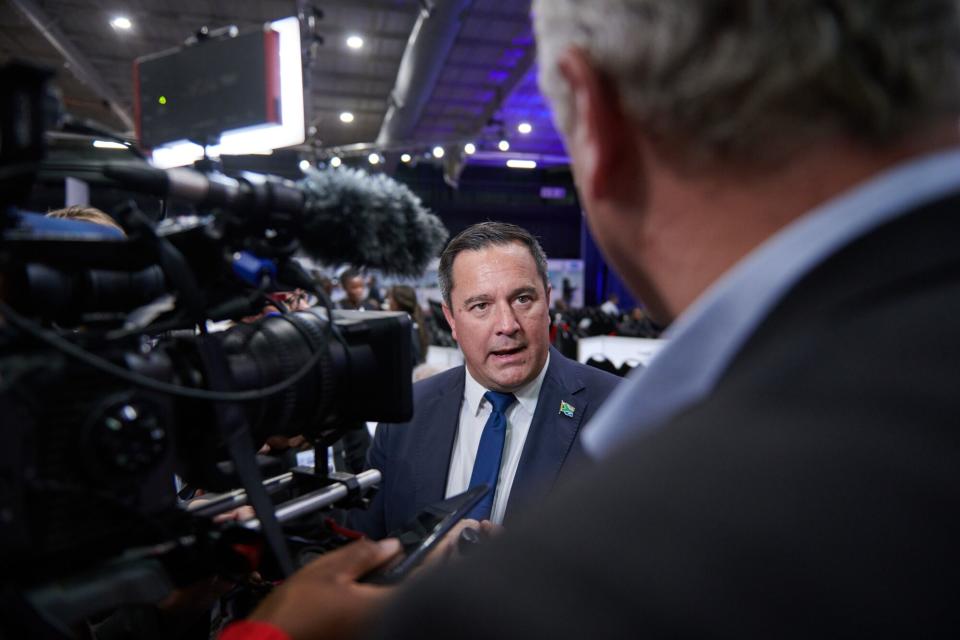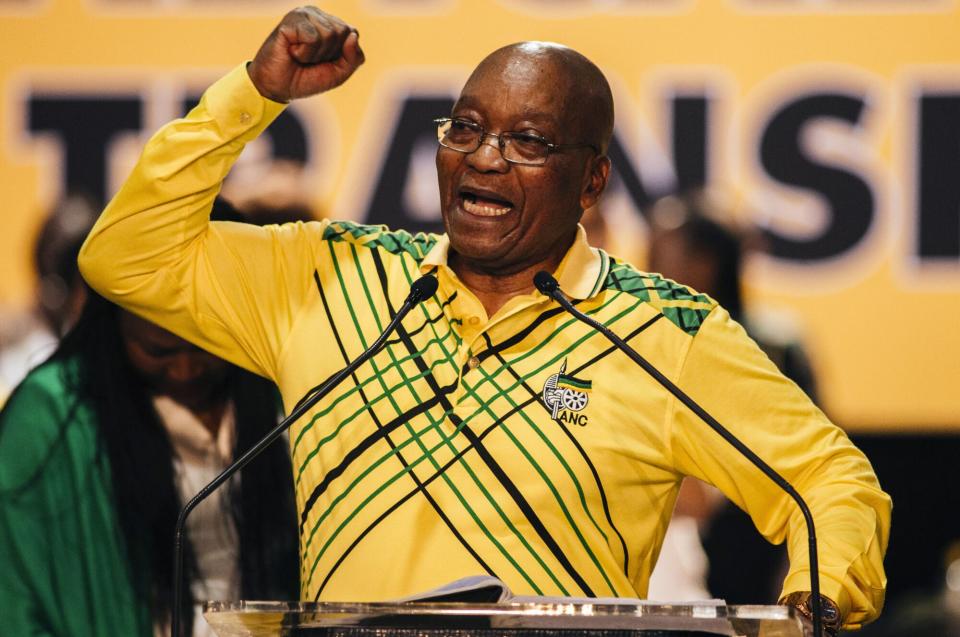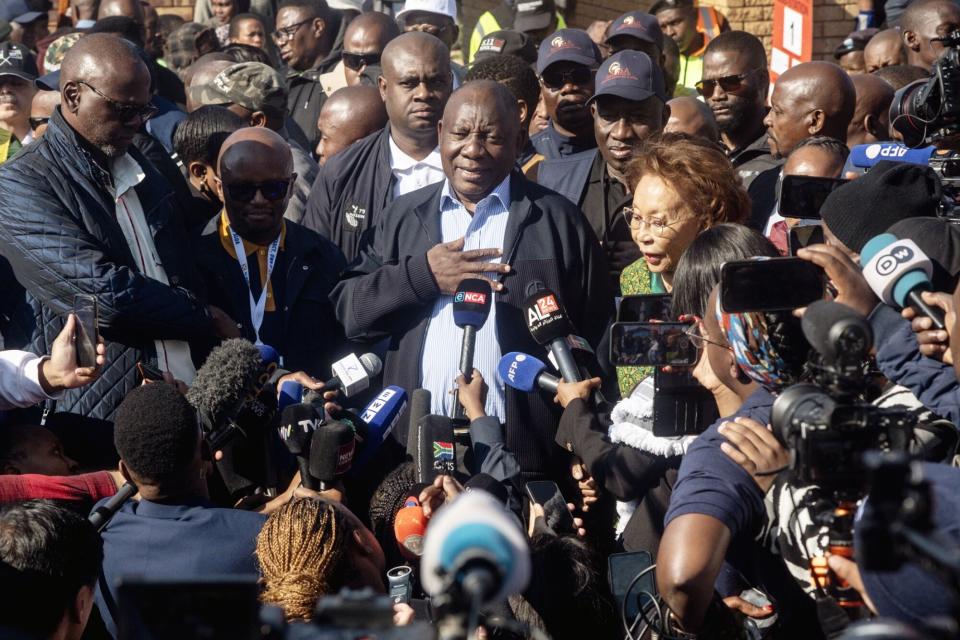What Next For South Africa After Seismic Election?
(Bloomberg) -- For the past three decades, South African politics has been defined by the African National Congress. After taking power under Nelson Mandela in the first multiracial elections in 1994, the movement shaped the nation’s new identity, dismantling discriminatory laws, extending basic services across color lines and opening up the mainstream economy to the Black majority.
Most Read from Bloomberg
Homebuyers Are Starting to Revolt Over Steep Prices Across US
Modi Set for Landslide Election Win in India, Exit Polls Show
Wall Street Billionaires Are Rushing to Back Trump, Verdict Be Damned
Saudi Arabia Puts Wall Street on Notice to Set Up Shop in Riyadh
Here Are the Latest Verified Results From South Africa’s Election
Today, South Africans faced with rampant poverty, mass unemployment, power cuts and endemic crime and corruption have run out of patience with the ANC. The party hemorrhaged support in May 29 elections, and partial tallies show it will lose its parliamentary majority for the first time by a substantial margin.
To retain power, the party will need to forge a coalition with one or more rivals, forcing it to embrace an unfamiliar world of messy trade-offs and difficult compromises over policies and appointments, with repercussions for citizens, businesses and investors alike.
Here’s what you need to know about the political shakeup:
Post-Election Coalition Scenarios
The ANC is set to win slightly more than 40% of the vote, partial results show. While it could theoretically form a minority government, it would struggle to adopt policies and legislation. If it does opt for a coalition, it would need backing from at least one of its three main rivals to get a parliamentary majority.
One potential partner is the business-friendly Democratic Alliance, which is on track to remain the main opposition with about a fifth of the vote. The DA banded together with 10 smaller rivals to form a bloc known as the Multi Party Charter that sought to unseat the ANC. But its leader, John Steenhuisen, has said he is open to a deal that avoids the “doomsday scenario” of a populist party joining the government.
The ANC and the DA have long had an adversarial relationship, clashing over everything from health and education policy to the management of the national budget. However, a survey by the Social Research Foundation conducted prior to the election indicates that an ANC-DA alliance would be the one favored by most South Africans.
The Economic Freedom Fighters party looks set to win about 10% support, making it another potential kingmaker. Formed in 2013 by former ANC youth leader Julius Malema, it wants to give the government a bigger role in the economy, placing all land under the custodianship of the state and nationalizing mines. Its populist rhetoric and confrontational style — its lawmakers have disrupted proceedings in parliament and brawled with security officers — have found resonance among many poor, Black township residents, whose living standards have improved little since apartheid ended. Malema said it shouldn’t be difficult for the EFF and ANC to find common ground on policy.
Another option is the uMkhonto weSizwe Party, or MKP, which was formed late last year and should win about 11% of the vote. It is led by former President Jacob Zuma, who fell out with the ANC. It draws much of its support from KwaZulu-Natal — the country’s second-most populous region. The new party wants to increase the power of unelected traditional leaders and nationalize mines and banks.
The ANC’s Legacy
The ANC is Africa’s oldest political movement, with roots dating back to 1912. During its first 15 years in office, the party oversaw the longest period of economic growth on record and increased access to free housing, clean water and electricity. The biggest blot on its record in that period was foot dragging in providing AIDS drugs during President Thabo Mbeki’s tenure. A study by the Harvard School of Public Health concluded that the delay probably caused the premature deaths of more than 330,000 people between 2000 and 2005.
The country went downhill during Zuma’s almost nine-year tenure as president. He presided over an era of endemic corruption known as state capture, during which more than 500 billion rand ($27 billion) of taxpayer funds was looted, according to government estimates. The ANC forced Zuma from office in 2018. His successor Cyril Ramaphosa replaced a number of key officials and sought to rebuild key state institutions, but has still struggled to turn the country around.
The economy has expanded by just 0.3% a year on average over the past decade — well below what was needed to maintain living standards for the growing population. The unemployment rate stood at 33% in March, and the income gap between rich and poor is wider than anywhere else in the world, according to available data compiled by the Thomas Piketty-backed World Inequality Lab.
Years of rolling blackouts have frustrated citizens and disrupted the economy, while dysfunction in the country’s rail freight system and ports has hobbled exports. Ramaphosa has tried to tackle these problems by increasing purchases of power from private producers, making it easier for companies to generate their own electricity and enabling private train operators to use the state logistics company’s tracks.
He’s also increased the size of the police force to try to bring crime under control. There were just under 27,500 murders in South Africa last year, up about one-third from 2019, with the per-capita homicide rate more than five times the international average.
Key Policy Issues
Welfare grants: Almost half of the population of 62 million receive welfare grants. A 350-rand monthly stipend was introduced during the coronavirus pandemic for the unemployed. The ANC has repeatedly extended the payment and has said it may introduce a permanent income grant if the country can afford it. The DA says that while the most vulnerable need support, the focus should be on creating the conditions for private enterprise to flourish and create jobs. The EFF wants all grants to be doubled, but hasn’t specified where the money should come from.
Land reform: The ANC has long promised to address racially skewed land ownership patterns, but progress has been limited. It tried to amend the constitution to make it easier for the state to take land without paying for it, but failed to secure the necessary support in parliament. The DA says property rights should be respected, while the EFF and MKP want land reform to be accelerated.
National health insurance: Last year, parliament approved enabling legislation for the phased rollout of universal national health insurance, a plan that’s aimed at providing quality treatment for the 85% of the population who have no medical cover and rely on a decrepit public system with too few doctors. Ramaphosa signed the measure into law earlier in May. The DA has said the plan is unaffordable, and a healthcare model is needed that improves the existing services and facilities, and guarantees everyone a basic level of care. The EFF says the primary healthcare system needs to be strengthened and more hospitals and clinics must be built.
The Market View
Despite the ANC’s poor record, the prospect of it being forced to share power in an unstable coalition that includes left-leaning parties has raised angst among investors and business leaders. Foreign investors have dumped more than 57 billion rand of South African stocks so far this year.
The rand and the nation’s bonds gained in the lead-up to the election, with investors expecting the ANC would secure enough votes to continue governing with one or two small rivals who wouldn’t insist on major changes to economic policy. As the extent of the ANC’s losses became apparent, they slumped anew.
The best-case scenario for investors now appears to be for the ANC to tie up with the DA because it would boost the chances of a more business-friendly administration.
The biggest anxiety is that the EFF or the MKP becomes part of the government and forces through policy changes, including the expropriation of land without compensation and increased spending on welfare. There’s also a risk that Ramaphosa — who remains popular among investors — will have to take the fall for his party’s poor showing, and either quit or be replaced by the ANC.
Most Read from Bloomberg Businessweek
Disney Is Banking On Sequels to Help Get Pixar Back on Track
Israel Seeks Underground Secrets by Tracking Cosmic Particles
US Malls Avoid Death Spiral With Help of Japanese Video Arcades
How Rage, Boredom and WallStreetBets Created a New Generation of Young American Traders
©2024 Bloomberg L.P.





